Similar to many other countries in Africa and elsewhere across the globe, agriculture in Tanzania is one of the sectors that has been greatly, and will continue to be affected, by climate change.
With over two thirds of Tanzania’s population depend on farming for their food and livelihood, climate change is therefore a great threat to their income, food security and their very survival. That is if nothing is done to support them cope with the changes.
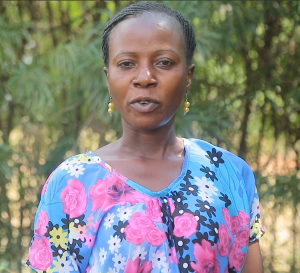
Agatha Filbert, from Kilosa District, Tanzania
“This year the harvests were really reduced. In previous years, I used to harvest 12 bags of maize from my one-acre farm. But this year I have only harvested one bag of maize,” says Agatha Filbert, a female farmer from Ilonga, Kilosa District in Tanzania.
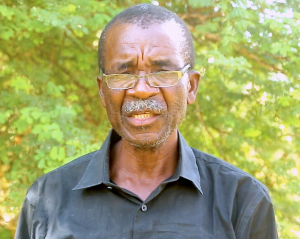
Farmer Meshack Nyanda from Kilosa District, Tanzania
This is confirmed by a fellow farmer, Meshack L. Nyanda “The rain was very little, hence the reduction in harvest compared to the other years, and climate change was not as bad as it is now. The rains were late and even when the rains came, the crops were already spoilt. The situation is the same in Zanzibar according to Hija AL Kaji, a rice farmer.

Farmer Hija from Unguja, Zanzibar
“Let’s say like this year, we have received very reduced rainfall. This is because it first rained in April and then stopped. It then rained continuously in May for around 20 days and after that, it stopped for good.
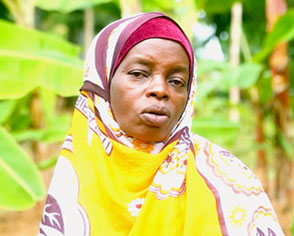
Climate change is affecting us for real.
“Climate change is affecting us for real. It is making my farming to become very difficult. First, when you plant crops like cassava, the earth is dry, and cuttings become dry. Adds, Khadija Hussein, a cassava farmer in Zanzibar.
Agathe, Meschack, Hija, and Khadija are part of the over a thousand farmers taking part in a project seeking to build their capacity and that of agriculture extension officers to cope with the negative impacts of climate change on their farming in Tanzania. Over 40% of them are women.
The project, Building Capacity for Resilient Food Security in Tanzania is funded by USAID and is a partnership between the Government of Tanzania and United States Department of Agriculture (USDA). The project is working with the Ministries of Agriculture, and the President’s office, regional administration, and local government (PO-RALG) in mainland and Zanzibar’s Ministry of Agriculture, Livestock and Natural Resources.
The project, which was started in 2017, has set up a network of 14 demonstration plots in various regions across the country to show farmers different climate-smart agriculture technologies and practices. These are in the semi-arid, southern highlands, and coastal agroecological zones.
Identification and demonstration of best-bet CSA practices and technologies
The project followed a participatory approach to identify the best-bet climate-smart agriculture practices suitable for each site. Farmers were interviewed to understand their farming systems and practices, preferred crops, and their existing mechanisms to cope with the impact of climate change.
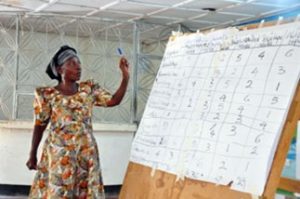
A farmer in an exercise to identify their most preferred CSA practices and technologies
The project also interviewed experts on the appropriate CSA technologies and practices and consulted Tanzania’s climate-smart agriculture guidelines developed by the Ministry of Agriculture, which are specific to the different agroecological zones.
With all this information, IITA and partners were able to develop a package of technologies and practices that enable farmers to cope better with climate change for demonstration. These include improved crop varieties with traits such as drought tolerance and enhanced nutritional profile such as protein-rich maize and iron‒zinc in beans. These were combined with good agronomic practices, safe and effective pest and weed management technologies, and appropriate soil and water conservation measures.
Each demonstration plot has a group of farmers who have been learning, alongside the district
and village-level agriculture extension officers, on selected CSA practices and technologies to enable them to cope with the negative impacts of climate change. Farmer field days are also organized to reach more farmers.
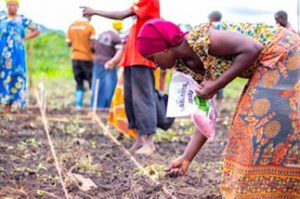
Farmers learning best planting practices of improved varieties including proper spacing in rows.
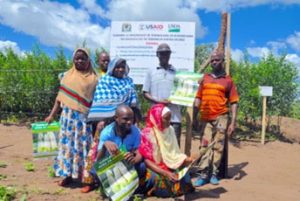
Members of a Farmers Field School pose for a group photo at the demonstration plot they are taking care of and learning from.
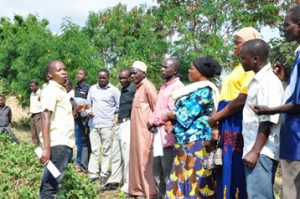
Farmers listening to an IITA’s field officer during a Farmers Field Day in Ruangwa District
CSA technologies and practices excite farmers
The farmers are really excited about the new practices and technologies introduced and are being demonstrated.

Shabani Shomvi from Ilonga, Dodoma
“We have learned many practices. One includes how to break the flow of excess water through the use of contours. We have also learned how to make tied ridges. The tied ridges conserve water. It seems the crops are planted on the ridge and even when the rain is not enough there is still some moisture in the ridge for the plant,” says. Shabanai Shomvi, a cowpea farmer from Ilonga.
The project is also working with the FAO and the Tanzania Meteorological Agency (TMA) to provide the farmers with down-scaled seasonal weather forecasts accompanied by advice and recommendations on what farmers can do based on the predictions.
I never used to follow the weather forecasts on media for. Now I will follow closely to find out how the rains will be; I will then use the appropriate practices and technologies I have seen, adds Shomvi.
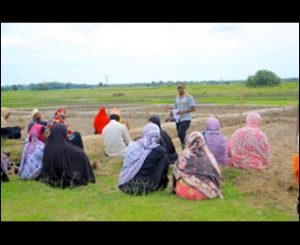
IITA field assistant training farmers in Zanzibar how to construct bunds to grow rice
The project stakeholders hope that the demonstration plots coupled with access to weather /seasonal forecasts, will go a long way to support farmers in the country to cope with climate change and secure their income and food.

A farmer reading a flier with the latest seasonal forecast from TMA


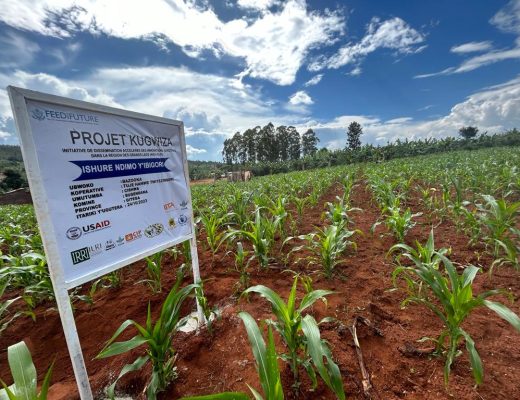
No Comments